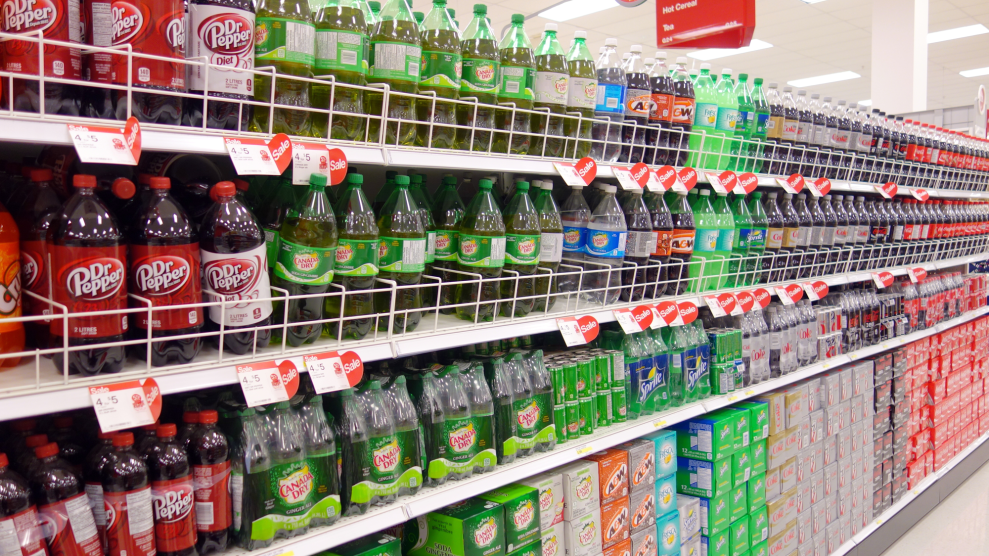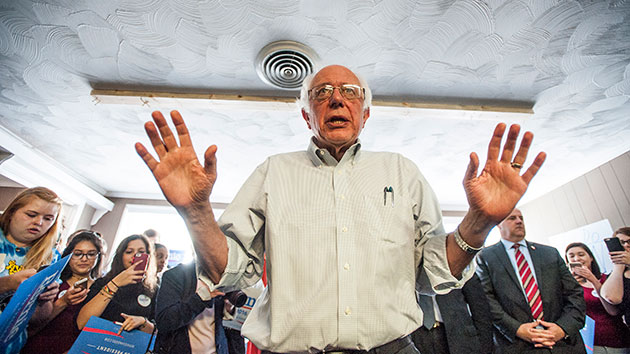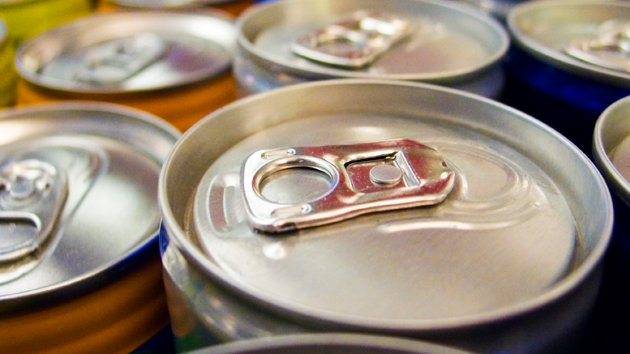Bite is Mother Jones‘ new food politics podcast. Listen to all our episodes here, or by subscribing in iTunes or Stitcher or via RSS. Listen to our segment on the soda industry’s effort to rebrand soda tax as “grocery tax” starting at 3:30.
I live in Oakland, California, and lately I’ve been getting flyers at my house with images like this:

Have you ever heard of a “grocery tax?” If not, that’s probably because most people know it by another name: soda tax.
I’ll get back to the brilliant rebranding in a second, but first, a little background: Once considered a radical idea, soda taxes are gaining momentum. Philadelphia passed one in June. In November, soda taxes will be on the ballots in San Francisco, Oakland, and possibly Boulder, Colorado.
In all these places, the basic idea is essentially the same: Drinking sugary beverages leads to obesity, diabetes, and a host of other health problems. Since soda companies target residents of poor neighborhoods, particularly people of color, those people end up disproportionately getting sick from drinking too much soda. The tax makes sugary drinks (not just soda, but any drink—juices, iced tea, etc.—with added sugar) more expensive, which in theory discourages people from buying them. The money the cities raise from the tax goes toward programs, like free preschool, that help the people that sodas hurt.
Of course, soda companies are not big fans of these taxes. And they’re dipping into their deep pockets to fight them: The last time a soda tax was on the ballot in San Francisco, the American Beverage Association, the soda industry’s lobbying group, spent $9.1 million to defeat it. And it worked.
That’s partially because the ABA employs some marketing geniuses—which brings us back to the phrase “grocery tax.” The ABA argues that it’s an accurate description because of the way soda taxes are structured. The tax doesn’t actually apply directly to the sugary drinks you buy at the store. Instead, they’re a tax on the distributors who sell sugary drinks to store owners. The distributor usually passes the tax on to the store owner, in the form of higher wholesale prices. Store owners can then decide to make up for that cost however they want. If they want to hike the price of soda, that’s cool. But if they want to keep the price of soda the same and instead raise the price on, say, a bottle of water or a bunch of kale, that’s totally fair game.
“That means whether you purchase [soda] or not, you could be seeing a big impact on your grocery bill,” says the No Oakland Grocery Tax website.
Not everyone agrees. Three members of the Oakland City Council have accused the No Oakland Grocery Tax campaign of misleading citizens. Councilmember Rebecca Kaplan told me over the phone that the campaign has “been lying to the voters of Oakland by trying to scare them into thinking that someone is going to tax their groceries.”
So who’s right? The question is whether store owners will apply the tax just to sugary beverages or spread it out to other groceries as well. Joe Arellano, spokesman for the No Oakland Grocery Tax campaign (which is funded by the ABA), says his group has done spot checks on stores in Berkeley, California, and found that store owners aren’t raising the prices on soda. When I asked for evidence, he sent me a bunch of photos showing diet and regular sodas priced the same (diet sodas are exempt from the tax because they’re sugar free), though he didn’t provide the kind of before-and-after documentation that showed that prices stayed the same after the tax went into effect.
Meanwhile, that team of University of California-Berkeley public health researchers studying the tax has found exactly the opposite: Most store owners in Berkeley actually have raised the prices on sugary drinks, the group reported. Two other groups of researchers had similar findings. (And it’s worth pointing out that those three studies were all peer reviewed, unlike the spot checks that No Oakland Grocery Tax has conducted.)
I talked to a few store owners in Berkeley this past weekend. Some said they had raised soda prices since the tax went into effect; some said they hadn’t. Among those who hadn’t, a few reported raising prices on other goods to make up for the difference. None of them were wild about the tax. Adel Gergess, the owner of a convenience store called Alex Market, told me that beverages make up a whopping 40 percent of his sales. He did the math, and he figured out that he couldn’t raise the prices on sodas or any other groceries, or he’d lose too much business. So he ate the cost himself. But it’s been really tough.
“We’ve been in the business like 19 months and we lost a lot of money,” he said. “Ninety percent of the beverages we have—even the organic or natural ones—have sugar.”
Soda tax proponents hope that the demand for sugary drinks will continue to fall, and that store owners will eventually ditch soda in favor of more popular items.
There’s some evidence that the plan is working. In a just-published study by a team at the University of California-Berkeley, researchers found that since the city of Berkeley enacted the nation’s first-ever citywide soda tax last year, soda consumption in poor neighborhoods has declined by 21 percent. A lead researcher called the findings “very encouraging.” It also showed that people were drinking 63 percent more water. (A caveat: Other factors may have contributed to the switch from soda to water—most notably, a public awareness campaign in Berkeley about the unhealthiness of soda.) Another hopeful sign: After Mexico passed a nationwide soda tax, soda sales decreased 12 percent, while bottled water sales rose by 4 percent.
The bottom line: The “grocery tax” argument has some truth to it—and so far, it’s certainly put owners of markets and restaurants in a bind. On the other hand, preliminary research on soda taxes—which shows that they might actually discourage people from drinking sugary beverages—is promising.
















